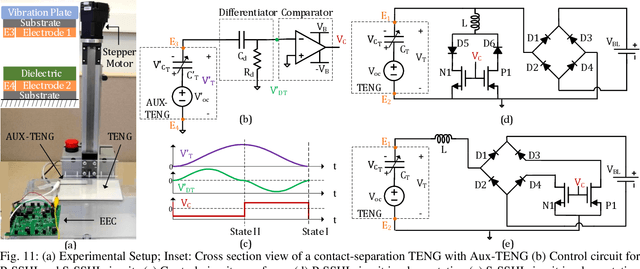Synchronous Inductor Switched Energy Extraction Circuits for Triboelectric Nanogenerator
Paper and Code
Feb 09, 2021



Triboelectric nanogenerator (TENG), a class of mechanical to electrical energy transducers, has emerged as a promising solution to self-power Internet of Things (IoT) sensors, wearable electronics, etc. The use of synchronous switched energy extraction circuits (EECs) as an interface between TENG and battery load can deliver multi-fold energy gain over simple minded Full Wave Rectification (FWR). This paper presents a detailed analysis of Parallel and Series Synchronous Switched Harvesting on Inductor (P-SSHI and S-SSHI) EECs to derive the energy delivered to the battery load and compare it with the standard FWR (a 3rd circuit) in a common analytical framework, under both realistic conditions, and also ideal conditions. Further, the optimal value of battery load to maximize output and upper bound beyond which charging is not feasible are derived for all the three considered circuits. These closed-form results derived with general TENG electrical parameters and first-order circuit non-idealities shed light on the physics of the modeling and guide the choice and design of EECs for any given TENG. The derived analytical results are verified against PSpice based simulation results as well as the experimentally measured values.
 Add to Chrome
Add to Chrome Add to Firefox
Add to Firefox Add to Edge
Add to Edge